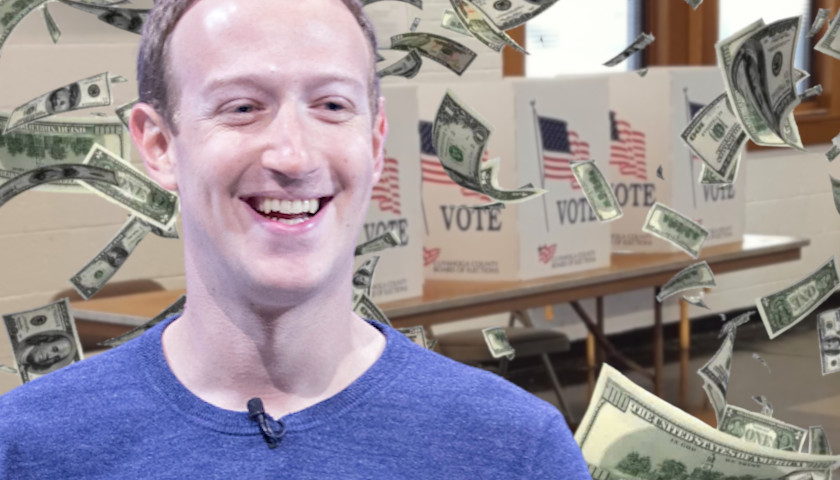by Fred Lucas
The Center for Tech and Civic Life—which four years ago doled out controversial election grants that became known as “Zuckerbucks”—recently notified White Pine County, Nevada, of a $20,000 grant.
The county, in a major battleground state going into the Nov. 5 presidential election, has a population of about 9,000 and is part of what the Left-aligned center calls its Rural and Nonmetro Election Infrastructure Grant Program.
The notification to White Pine County came with a message from Tiana Epps-Johnson, CTCL’s executive director, and an agreement on how the $20,000 grant could be used.
“I applied for the grant because my election storage building is in need of repairs and upgrades, in particular, to the security system,” White Pine County Clerk Nichole Stephey told The Daily Signal.
“I intend to purchase and have a company install a security system that is more reliable than what I currently have. I also purchased another ballot tabulation scanner to make voting as efficient as possible and avoid long lines,” Stephey said. “I purchased some signs [and] crowd-control items, and need to find another voting booth.”
The Center for Tech and Civic Life’s rural grant program also awarded $50,000 to Douglas County, Nevada, and $30,000 to Big Rapids, Michigan.
The term “Zuckerbucks,” sometimes shortened to “Zuckbucks,” emerged after Facebook founder Mark Zuckerberg and his wife dumped about $400 million into election administration in 2020 that overwhelmingly went to heavily Democrat areas.
After the resulting controversy, Zuckerberg swore off such donations. But the CTCL continued to give money to run elections even as multiple states banned private funding of public election administration.
Nevada and Michigan are the only 2024 battleground states that didn’t ban Zuckerbucks. The swing states of Arizona, Georgia, North Carolina, Pennsylvania, and Wisconsin are among 28 states that passed bans on private election funding, according to the Capital Research Center, a watchdog group.
The group defines “rural” and “nonmetro” broadly as a jurisdiction with a population of 20,000 or less. “More than 70% of applicants to the program represented election officials working in the nation’s smallest jurisdictions—those with 5,000 voters or less,” according to an early CTCL report on the rural grants released Monday.
It’s not just Zuckerberg who wrote checks for election administration on the local level.
The Center for Tech and Civic Life has been funded by left-of-center donor organizations such as the Skoll Foundation, the Democracy Fund, the New Venture Fund, the Hopewell Fund, and the Rockefeller Brothers Fund, according to the Capital Research Center.
Epps-Johnson, executive director and co-founder of CTCL, previously was the election administration director at the New Organizing Institute, which did digital work for the Democratic Party.
So, why would a left-leaning organization such as the Center for Tech and Civic Life want to issue grants to rural areas? Election maps can be telling, said Kerri Toloczko, executive director of the Election Integrity Network.
“Out of 17 counties in Nevada, for example, only two voted for President Biden in 2020, yet he won the state by 2.4%,” Toloczko told The Daily Signal. “Liberals know this too, and in some states, influencing the vote by just a few rural counties could shift results for the entire state.”
The CTCL, which didn’t respond to inquiries from The Daily Signal, last week issued a press release touting the expansion of the Rural and Nonmetro Election Infrastructure Grant Program.
The organization argued that Congress insufficiently appropriated $55 million to implement the Help America Vote Act.
“The program has helped election officials modernize outdated voting technology; improve access to voting for rural voters, seniors, and veterans; and make much-needed infrastructure updates to enhance election security and make voting smoother for all voters,” the CTCL press release says of the rural grant program.
The CTCL touts rural grants in jurisdictions across eight other states: Connecticut, Maine, Massachusetts, Minnesota, New Hampshire, New York, Oregon, and Vermont.
It’s difficult to meet the aims of the CTCL with rural grants, often in non-battleground states, said Ned Jones, director of the Citizens Election Research Center, an affiliate of the Election Integrity Network.
But, Jones said, the Left has been targeting what it calls the New American Majority—people of color, the young, and single women. And it might seek to reach that population in rural areas.
“Their internal polling may show they are losing margin in the urban areas in blue states, so they are trying to increase the margin in blue rural areas, decrease the margin in red rural areas,” Jones told The Daily Signal. “They have been messaging that election offices are underfunded, especially in rural areas, so this may be to play to that narrative.”
In Connecticut, the Center for Tech and Civic Life gave a $5,000 grant to the town of Colebrook and a $20,000 grant to the town of Winchester. Both grants were issued in August.
In Maine, the CTCL made grants of $5,000 to Belgrade, $20,000 to Caribou, $5,000 to Houlton, $20,000 to Farmington, $20,000 to Presque Isle, and $5,000 to West Paris.
In Massachusetts, the center gave $5,000 to Northfield and $20,000 to Orange.
The CTCL gave a $20,000 grant to Nobles County, Minnesota. Although a longstanding blue state, early in the year Minnesota was seen as a potential swing state when Biden was still in the presidential race. The 2016 presidential race in the state between Hillary Clinton and Donald Trump also was tighter than expected.
The CTCL gave $20,000 to Meredith, New Hampshire, $20,000 to Hood County, Oregon, and $55,000 to Delaware County, New York.
In Vermont, the center gave three $5,000 grants each to the towns of Washington, Norwich, and Mendon.
– – –
Fred Lucas is chief news correspondent and manager of the Investigative Reporting Project for The Daily Signal. He is the author of “The Myth of Voter Suppression: The Left’s Assault on Clean Elections.”
Photo “Mark Zuckerburg” by Anthony Quintano CC BY 2.0. Background Photo “Voting Booths” by Tim Evanson. CC BY-SA 2.0.








